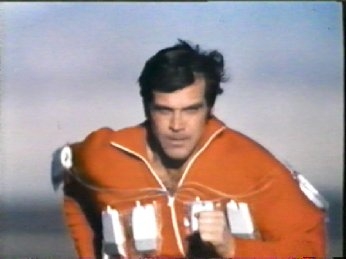 |
| Woah. I'm a digital human! |
Weird thought: Television falls into the realm of digital humanities, but television wasn't required to be digital until just a few years ago. But I guess having an Analog Humanities would've just been silly.
Now that that's out of the way, Fitzpatrick's quick coverage of Kirschenbaum's more in-depth "What Is Digital Humanities abd What's It Doing in English Departments?" (ADE Bulletin 150, both fairly recent) both try to bring us to the point that DH (the field, not the author) is the thing we've always done, but now we're using the power of technology to make it better.
 |
| Steve! Stop! We can get the library to PDF our sources to us! You don't have to run there! |
More importantly, is this new? (Yes, it's a contrived question. I'm trying to answer a prompt here.) Folks like Lanham and Ohmann and Selfe and Cooper and Hawisher and others were building up the wonders of technology ages ago. Even my favorite mad inventor has been telling us how much computers can do for humanity, leading to all sorts of literature and film adaptations of his theories. But, those folks were looking forward at all the possibilities technology could bring. Current conversations seem to look at what we can do now that the potential has solidified a little more.
| Woah. My brain can hold more than 250 of the greatest literary works of all time! |
are going to get a funky alignment because I flubbed an HTML tag.
And, like others have noted before me, the prevailing abilities in the means of production dictates the kinds of things we'll produce. So long as I have a big stand mixer, I'll keep making bread. So long as I'm using this blog service, I'll keep adding pictures, links and spinning GIFs to my reading responses. I refuse to do any of those three in traditional print.
Hey, did you know that in just a few short years, you'll be able to pet your Nintendogs? Yeah, that's messed up. Technology is becoming more immediate every day. Does this mean we'll be able to assign projects where students express themselves using only textures?
 |
| This is my report on Antebellum tariff policies in the Ohio Valley. |
When I'm reading or viewing, especially on this series of tubes, I'm not thinking about the fact that I'm scrolling through text or clicking through links. Bolter and Grusin's notion of replacement (48) explains the greatest strength and the worst flaw of electronic ultramedia (mmm, self citation, makes me feel like Kress). At any time, I can summon up a new page, new line of thought, new anything. The interface isn't exactly invisible (those of you with parents who aren't as adept at navigating the blogosphere know what I mean), but it's transparent enough that I think about it less than I think about turning a page. Especially since I can't turn a page without getting two or three at a time.
With this ease, though, comes an almost insatiable need to keep redoing what's been done with the tools we've got now. It's sort of like getting a new power tool. The world needs another Great Gatsby remake as much as my walls need more holes in them, but darn it, if I've got the power to repurpose that useless wall into a speaker-holder, then Di Caprio should get to do what he wants as well.
 |
| I take that back. I draw the line at 3d. |
This "aggressive remediation" (48) at first made me think of such masterpieces as Videodrome (1983), in which we are regularly told that "television has become the aperture of the mind." Of course, Bolter and Grusin are quick to point out that in our era, virtual reality is a preferred mode because it mimics our subjective point-of-view reality (77). I'm getting a little far from composition issues here, but like Hawisher and Selfe ("The Rhetoric of Technology and the Electronic Writing Class" CCC 42:1) said in the early 90s, we need to be wary of where all this stuff can lead us. The internet may well be the new "aperture of the mind," which might explain why writing instruction has taken such a drastic turn over the past few years (not for better or worse, just a new direction). And it might be "dangerously shortsighted" (Selfe's CCCC Chair's address, 1997) not to think about these affordances of technology, mediation, remediation, and hypermediation in the classroom, but we've got to stay a few steps back to get an idea of the broader picture.
To paraphrase George Carlin, not every Tweet deserves a citation.
Unbelievable timeline, worth a laugh, and definitely perfectly evaluative in its content. However you created this--which I believe I overheard you say you did the HTML--it is truly a mastery you seem to have of certain important elements. I thought the drawings or little depictions with the light shining from the screens was a great mediation. Utterly (not udderly) impressed.
ReplyDelete